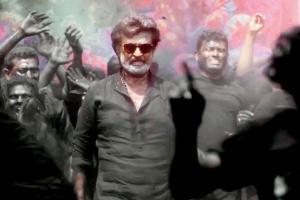Kaala, in a sense, isn't exactly a Rajinikanth (super-hero) film.

Kaala
Kaala
U/A: Drama crime
Director: Pa Ranjith
Cast: Rajnikanth, Nana Patekar
Rating:
ADVERTISEMENT
This is the most layered, heavily cathartic, even if fairly visceral, in-your-face, sort of political film, that you're likely to see in 'hardcore mainstream' — let alone with Rajnikanth in it, who inhabits a parallel cinematic universe anyway. What sort of superstar is Rajni, in a global context? A Superhero, obviously — a character all by himself, that a captive fan-base walks in for, essentially to check out his antics (dialogue, daredevilry).
Kaala, in that sense, isn't exactly a Rajinikanth (super-hero) film. Outside of two sensational action set-pieces, superstar Rajni comes across as a rather fallible, even slightly feeble, one-man vanquisher of evil, chiefly deriving his super-power/strength instead from a vast army of die-hard supporters, who can build a wall around him that the enemy's lathis and bullets will find hard to penetrate.
Or maybe this is only in line with the super-hero genre in general. We've reached a point (Avengers: Infinity War) where a full inter-galactic coalition of superheroes have to submit themselves before the might of the anti-hero Thanos. This perhaps only reflects the popular world-view at present, with undisputed 'evil' appearing to have a winning hand over uncontested notions of what's good, fair, or the right thing to do, or say. As for politics, only recently, Black Panther became the first Marvel film with a predominantly black cast.
Who'd be the closest equivalents of blacks in a wider Indian scenario? Dalits, of course. Kaala is most overtly about Dalit emancipation. It questions practices and notions around purity and colour, that have helped develop tools and constructs for oppression over centuries. Some of this is dealt with through imagery, of Ambedkar in a corner (or "Jai Bheem" for a chant); sometimes it is more direct, like the villain (Nana Patekar), who wouldn't drink water at Kaala's home. The proverbial waters are muddied further by mixing religion with politics, pitting (poor) Hindus against (poor) Muslims instead —both drowning in the same cesspool. Rajni's Lingaa (2014), for instance, although equally nobly intentioned, lacked such layers.
So yeah, I'm not going to stretch the American super-hero analogy too much, since this is, in every sense, a film rooted wholly in the reality of 'urban poor'. At the centre of it, effectively, is politics over land, the material conflict that outlines almost every political issue we know, and villains we label, from terrorists in Kashmir, to Maoists in Central India. The film starts out with a graphic history of the world, which, it argues, is basically a history of conquerors and the enslaved, with land being the currency of power.
So Mumbai's slum Dharavi, a real-estate gold-mine, where Kaala is set, is merely a metaphor, although captured with much precision (even if mainly recreated at a Chennai studio), getting its geographical detailing right — from the 90 Feet Road, to Prateeksha Nagar (in Sion), nearby. As the Mumbai don Karikaalan, Rajni plays an extremely playful, good-humoured, highly accessible messiah (unlike Kamal Haasan in Nayakan), lording over a tin-roof empire built by migrants from Tirunveli in Tamil Nadu. He often walks around in black shirt and lungi, much like Amitabh Bachchan's Subhash Nagre (Sarkar), modelled on Shiv Sena chief Bal Thackeray, who in turn might well be the inspiration for Nana Patekar's character in this film instead — especially when drawing the sword.
Nana (phenomenally powerful screen presence) is always dressed in white, considers himself Ram: "Born to rule." Kaala is referred to as Raavan. The inversion of Ramayan is complete. The symbolisms are unparalleled. Nana's power-hungry top-politician, sophisticated land-grabber, is also sometimes seen with thick white stubble in election hoardings eulogising "development". This analogy will be lost on no one.
Where the film did lose me as an audience though is the long, meandering road (three hours plus) it takes to hover around the core. This, despite such well-defined lead characters, and some well-staged scenes. It becomes, in parts then, an unnecessary love triangle between Kaala, his lovely wife (Eeswari Rao), and a love from the past (Huma Qureshi).
An under-realised Mob-opera, where the don (somewhat inspired by S Thiraviam Nadar) appears to have run out of games to play. But most significantly, an altogether non-Rajni superhero franchise, where his swag is, more often than not, simply in the suggestion. This happens, I guess, because the filmmakers, low on finesse, have made too many movies simultaneously (which is still leagues ahead of their last one, Kabaali). I suggest, for whatever it's worth, you see it as a strikingly sound screenwriter/thinker Pa Ranjith's personal political treatise, with Superstar Rajni in it. The fact that Ranjith can pull that stunt off, I suspect, is the greatest super-power of all!
Watch Kaala Trailer
Also Watch: Is Rajnikant's Kaala worth a watch?
Catch up on all the latest entertainment news and gossip here. Also download the new mid-day Android and iOS apps to get latest updates
 Subscribe today by clicking the link and stay updated with the latest news!" Click here!
Subscribe today by clicking the link and stay updated with the latest news!" Click here!






